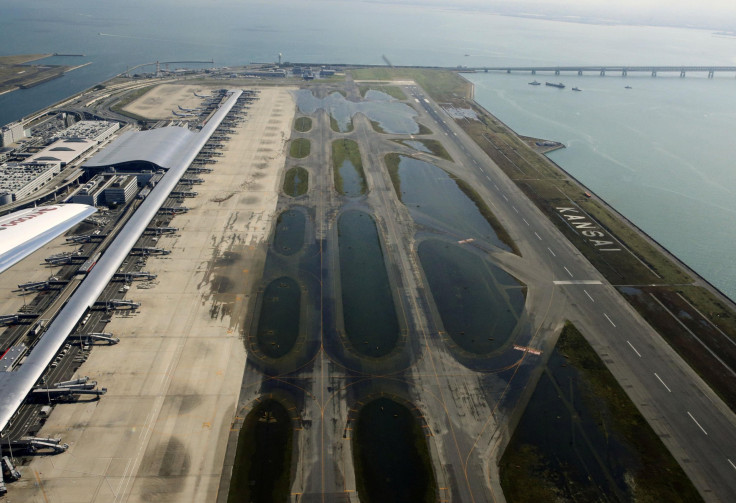Japan Typhoon Jebi Update: Several Dead, Homes Without Power, Airport Closed
Typhoon Jebi, the strongest to hit Japan in 25 years, brought strong winds and heavy rainfall across the country Tuesday, killing 11 and destroying over 300 houses. More than a million homes were left without power.
Powerful gusts swept a tanker into a bridge to Kansai International Airport, forcing the airport to close down and cancel all flights.
An airport company started transferring 3,000 stranded passengers who stayed overnight at the airport to nearby Kobe airport by high-speed boats and buses Wednesday. Mami Yamaguchi from the New Kansai International Airport Company told CNN that each boat has the capacity to carry 110 passengers, and it would go back and forth until all passengers are evacuated from the airport.
"Equipments and machines were damaged by the flooded water in a part of the terminal. We don't know when we can re-open," Yamaguchi said.
Chief Cabinet Secretary Yoshihide Suga also said it was not clear when the airport would reopen. The roads and train lines in the affected areas will also remain closed until further notice.
“The government will continue to do everything possible to tackle these issues with utmost urgency,” he said, Reuters reported. He also said one man died in Higashiomi City after the warehouse he was working in collapsed.

Akihiro Kikuchi, from Japan's Meteorological Agency, said Typhoon Jebi made landfall around Tuesday noon with winds of up to 216 kilometers per hour. According to the Fire and Disaster Management Agency, almost 14,000 residents were moved to around 5,000 refuge zones, mostly town halls and school gyms.
Japan's trade ministry said the JXTG Nippon Oil & Energy Corp closed at least one of its refining units due to typhoon damage caused to its cooling tower. Toshiba Memory, the world’s second-largest maker of flash memory chips, may have to ship products from other airports if Kansai remains shut, it added.
Daihatsu Motor Co. also stopped production at its Kyoto and Osaka factories, while Panasonic halted work at its air conditioning and refrigerator factory in Shiga.
Local daily Asahi reported that a man in his 70s died after being blown to the ground from his apartment in Osaka prefecture while five others died after being hit by flying objects or by falling from their apartments. A man died when a storage building collapsed on him in Shiga prefecture, and another man died after falling from a roof in Mie, police said.
Prime Minister Shinzo Abe canceled a scheduled trip to Kyushu to oversee the government's response to the typhoon. He posted several updates on the rescue efforts at Kansai. He also urged people to evacuate at the earliest and ordered the authorities to take all necessary measures to protect the residents.
"I urge the Japanese people to take action to protect your lives, including preparing and evacuating early," he said, Channel New Asia reported.
The typhoon has brought nearly 20 inches of rain in some areas, increasing the threat of widespread flooding.
© Copyright IBTimes 2025. All rights reserved.





















